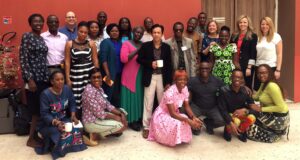Too many people, most of them living in low- and middle-income countries, do not have access to the prevention, treatment, and care services they need.
Unitaid, as part of the global health community, recognizes that communities and civil society partners are instrumental in driving the impact and effectiveness of the response.
Our Goal
Unitaid is committed to meaningful community and civil society engagement (CCSE) for the introduction and adoption of key health products that are demand driven, people-centred and affordable. We collectively overcome the various access barriers, making way for successful scale-up of these life-saving products. Read more in Unitaid’s Community Engagement Framework.
Only with significant engagement of communities, with community-led approaches, will we be able to reach equitable access to game-changing health products. This is why people are at the heart of Unitaid’s work and strategy.
Dr Philippe Duneton, Executive Director of Unitaid
Unitaid has partnered with communities and civil society organizations since its creation in 2006 with voting seats for the Communities and NGO delegations.
Our increased engagement efforts have translated into our funded programmes and are clearly stated in our Strategy 2023-2027 which:
- Places people at the centre: People and their communities have driven the identification and implementation of areas of work.
- Highlights that community-led approaches are central to ensuring that our work reaches all who can benefit, especially at-risk and marginalized people.
- Highlights that seeking the input and participation of communities and civil society — at the local, country, and global levels — helps to ground Unitaid’s investments in people’s needs and the constraints that the realities of their lives may place on the success of our interventions.
- Builds on the successes of the past, but it encompasses an even stronger engagement and collaboration with affected people and communities to ensure they are part of every step of Unitaid’s work.
- Recognizes that diversity, equity, and inclusion are central to Unitaid’s mission and that integrating those values in every intervention will always yield better outcomes.
- Envisions a phased increase in engagement with both country stakeholders and community and civil society partners.
Importance of engaging communities and civil society across Unitaid programmes
Unitaid recognizes the importance of meaningful engagement of communities, with support of civil society, as critical for demand creation, including understanding care seeking behaviors (and barriers to access), increasing diagnostic and treatment literacy, and ensuring responsible use of new drugs and regimens. Their leadership guarantees Unitaid’s portfolio responds to the needs of key and vulnerable populations and contributes to the success of our supported programmes.

Clinton Health Initiative OPTIMAL HIV Community Advisory Board (Image: Unitaid)
We strongly encourage our implementing partners to consider including Community Advisory Boards (CABs) in proposals and programmes. CABs have the proven potential to create more inclusive and informed community responses to meet project objectives.
Unitaid also applies small grants model for the engagement of communities and local CSOs as part of several funded projects. The small grants model provides financial resources to local communities and civil society organizations to support the development of advocacy and health literacy tools and materials, build capacity and organizational development, and increase demand for the introduction of new health products.
What’s next?
Meaningful engagement of communities and civil society remains an important area of focus for Unitaid. Together with our funded partners, we strive to ensure compensation for essential community expertise and responsible transition that is provided.
Unitaid is committed to:
- Strengthening demand creation capacity for programmes and supported health products and expanding the role and capacity of communities to raise awareness and generate learning.
- Empowering & strengthening representation (& voice) of communities of people living with & affected by diseases and strengthening monitoring of community engagement and in evaluation of grant outcomes.
- Engaging with a broad set of stakeholders to foster alliances and leverage existing successful mechanisms while ensuring sufficient capacity to provide the assistance to strengthen representation.
- Funding to ensure adequate resources for community engagement within Unitaid funded programmes.
